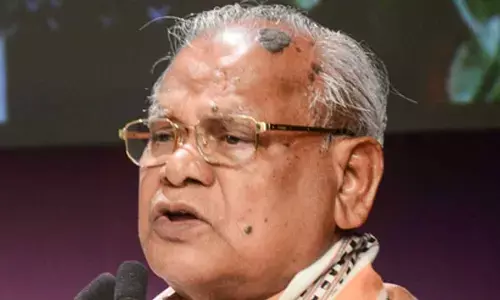Who will bell bigger cats? Lessons from Leena Dixit case

Who will bell bigger cats? Lessons from Leena Dixit case
With the confirmation of dismissal from service by the Supreme Court on July 11, while the career of Leena Dixit, an Additional Sessions Judge from Madhya Pradesh abruptly came to an end for just ‘one and first’ mistake, as contended by her.
Hyderabad: With the confirmation of dismissal from service by the Supreme Court on July 11, while the career of Leena Dixit, an Additional Sessions Judge from Madhya Pradesh abruptly came to an end for just 'one and first' mistake, as contended by her.
Rejecting her mercy plea, a three-judge bench comprising Justice U U Lalit, Justice Ravindra Bhat and Justice Sudhanshu Dhulia termed the modification of sentence awarded by her as 'quite shocking'. The petitioner who was appointed as the Additional Sessions Judge in Madhya Pradesh was on probation. To her misfortune, the first case, a murder case that was before her, turned out to be disastrous. The IPC under Section 302 provides for the punishment of life imprisonment or death and fine for this offence. The petitioner judge while finding the accused guilty, awarded the punishment of five years imprisonment. Later, when the Public Prosecutor brought the violation of law to her notice, she converted the charge from Section 302 to 304, that is, culpable homicide not amounting to murder. Thus, the petitioner herself altered her judgment which is nothing but a Review which is not permissible under the criminal law.
As the said was still undergoing her probation, the Administrative Committee of the High Court considered the matter and finally terminated her services. Aggrieved by the termination, she knocked the doors of the Apex court by way of a Writ Petition which she herself argued personally.
Obviously, nobody would sympathise with such an ignorant, callous and irresponsible Judge who was empowered by law even to award the death penalty. The highest court of the land has undoubtedly held the India's head high by not sparing even a senior judge like the Additional Sessions Judge for her unpardonable unbecoming behaviour.
Having said so, a look in retrospect would also be in place. The court could easily get rid of Leena Dixit because she had not completed her term pf probation or demotion of another judge who had belittled the offence of rape stating there was no skin to skin contact. Now, think for a while, had Leena, already completed her probation and also think that she was appointed as the judge of a High Court or the Supreme Court; what treatment she could have got from the Apex court!
Obviously, not the similar. The judicial history, unfortunately though, is replete with 'adamant or defiant' Judges of the higher echelon, shrugging off all and sundry charges against them, including the charges of corruption and sexual harassment! There are umpteen instances in history that even after the recommendation by the Supreme Court to impeach and remove an erring or a corrupt Judge, the parliament dominated by the elements 'supporting' such undesirable elements in higher judiciary, had brazenly shielded the filth. Apparently, bolstered by such political support, the concerned judge/s retired 'Honourably' upon reaching the age of superannuation.
In fact, it is this political protection that makes a judge of the superior hierarchy uncontrollable, unbridled and at times, a creature living in the fool's paradise even thinking itself as being above the law. The moot question is: Who will discipline the judges of the higher judiciary? A few years back, a judge of the erstwhile Andhra Pradesh High Court hailing from the upper caste, had allegedly abused in the name of a caste and thrashed a judge of the subordinate court. The matter went up to the parliament and the stage for the impeachment of the High Court Judge was set. However, for the reasons not known, the whole move was dropped. The reasons are obviously, anybody's guess. This judge too, retired 'Honourably' after attaining the age of superannuation. Recently, two judges were in the eye of a storm over extraneous or obiter dicta remarks passed against a petitioner who had just prayed for the transfer of several cases on the same subject matter. Except some verbal protests, nothing tangible happened to these judges. In short, if one is occupying the higher post in judiciary, he can do anything and everything with impunity. Perhaps, this is so because of lack of accountability that His Lordship or Ladyship go scot-free even after being caught red handed!
Another fallout of Leena Dixit case is that now on all judges of the subordinate courts, particularly those on probation, would be conscious and at times over-conscious while passing judicial orders, directions and judgments! This situation, though desirable generally, is certainly not conducive for the promotion of an independent and fearless judiciary. Further, there is every possibility of denial of justice from such fear-psychosis suffering judges.
Tiger abhi zinda hai!
True to the adage, the cases are ever green, the Supreme Court recently reminded a civil case involving property dispute launched in the year 1964 to the Allahabad High Court for reconsideration.
A division bench comprising Justice S Abdul Nazeer and Justice Vikram Nath dealing with the case titled, Farooqi Begum through LRs Vs State of Uttar Pradesh observed that the High Court fell in error in not taking into consideration the relevant material and instead relying upon inadmissible evidence or evidence which had no bearing to the findings.
Delhi hc adopts novel approach on abortion
In a truly novel and humanitarian approach, the Delhi High Court has said that allowing the medical termination of about 24 weeks old pregnancy, would mean virtually killing the child, to which the law does not permit. The court while reserving the order, suggested that the petitioner should consider delivering the child and giving it in adoption.
The division bench comprising the Chief Justice Satish Chandra Sharma and Justice Subramanium Prasad in a case titled, Ms.X Vs. The Principal Secretary, Health and Family Welfare Department, GOI added that there are big queues for adoptions. However, the court clarified that it was not forcing the petitioner to raise the child. "We will ensure that the petitioner goes to a good hospital. Her whereabouts will not be known. You give birth and come back."
Indeed, such an extraordinary stand by the High Court is praiseworthy. It reflects the human sensitivity of the court which is otherwise considered as a heartless machine attempting to deliver justice.
No relief to Rahul Gandhi
In a set back to the Congress leader Rahul Gandhi, the Jharkhand High Court has dismissed the plea seeking to quash the defamation case filed against him for his alleged statement, "why all thieves share the Modi surname." Justice Sanjay Kumar Dwivedi in his order, observed that the right of reputation, as per judicial interpretation, is the dimension of the right of life.
Hope, the loose tongue politicians would at least from now on, control their language while criticising their political adversaries.









